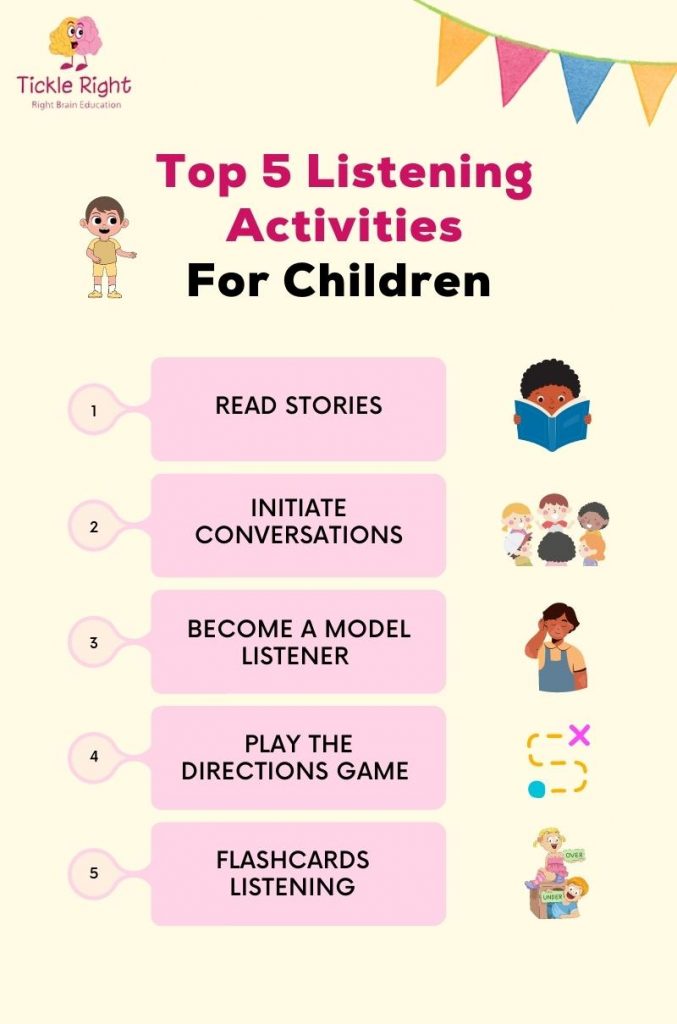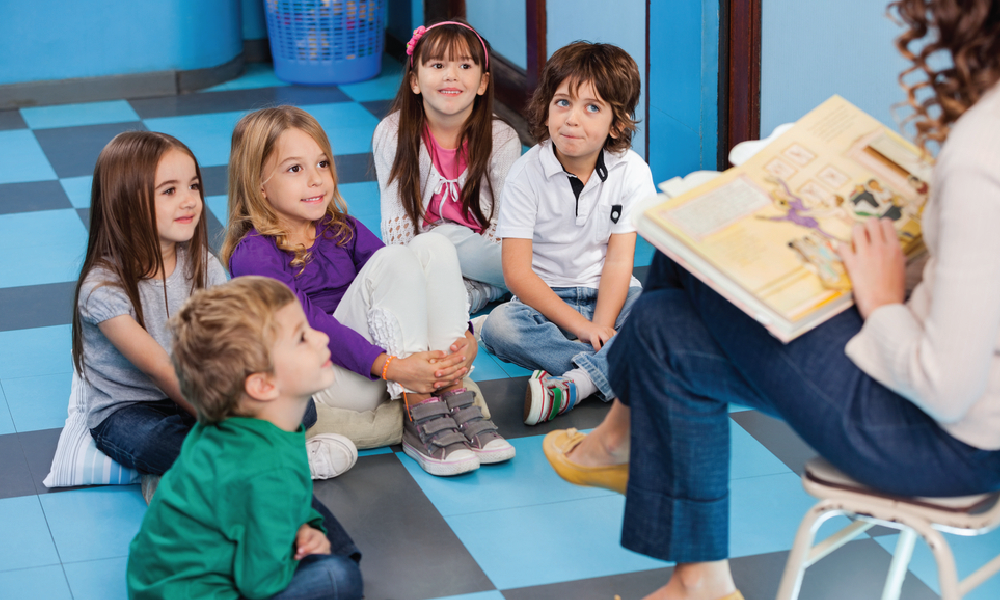Top 10 Games & Activities To Develop Listening Skills In Kids
Top 10 Games & Activities To Develop Listening Skills In Kids
If you’re looking for some simple yet effective ways to enhance your little one’s listening skills, you’ve come to the right end. Grabbing their divided attention or strengthening their ability to listen & respond appropriately requires time. Their ability to listen may seem like it is not important. However, it does not come intrinsically at a young age. It entails several aspects like coordination & control that require constant nurturing over the initial years.
A child’s sense of hearing starts to build in a mother’s womb itself. They initiate responding to their mother’s voice soon after birth. At this stage, a child is still not listening, so don’t puzzle between the two. As they grow, they recognize & react to noises. They learn to differentiate between them which lays the groundwork for language & communication. In turn, speech, building attention, reading & phonological enlightenment.
We at Tickle Right encourage participation & value listening for the development of your child’s good listening skills. Read ahead to know more.
Top 5 Listening Activities For Children
The best listening activities have the ability to develop language skills, social skills, & auditory perception. It is one of the most important parts of a child’s wholesome cognitive development. You can consider it as a means to develop these skills with lasting-affect fun activities.

1. Read Stories

Daily reading helps a child improve their listening skills by engaging them in stories of different characters. This helps them comprehend the part effectively & understand the sentence structure too. Always remember to put up questions about the next predictions. Another way to listen to these stories is through audiobooks. It not only improves reading accuracy by 52% but also promotes brain development & language skills.
2. Initiate Conversations

Conversation skills encourage children to think about new ideas & explore topics that interest them. This is also a means to introduce interesting facts that engages them in active listening. Through an opportunity like this, you allow your children to express their viewpoints & indulge in the discussion. These two-way conversations are incredibly great for children to listen to & convey simultaneously.
3. Become A Model Listener

You are your child’s biggest role model. They will leave no chance behind to copy your behavior & actions. Therefore, they are willing to learn from the best. Modeling behavior like active listening to your little one or maintaining eye contact during the conversation catches their attention. You must give due consideration to what your child’s saying to make them follow the same with you & the others.
4. Play The Directions Game

Teaching your child to listen & follow directions strengthens their logical & listening skills. It allows them to think about what they’re being asked to do & decide to follow it then. This activity allows them to actively listen to the instructions. The overall objective of such a game is to help them develop a helpful behavior with reasoning & problem-solving abilities. Some of these games are Musical Chairs, Simon Says, Statues, & many more.
5. Flashcards Listening

Oh, what better than listening with flashcards! There are several benefits of teaching your child important skills with the help of flashcards. It allows for building photographic memory & sparks visual stimulation. This presents an opportunity to create your own games to engage them in listening carefully. Such as, placing a pack of flashcards on the floor or a table. Randomly call out words and ask your child to pick up the flashcard that resembles it.
5 Fun Listening Skills Games For Kids
Parents often struggle to get their children to listen to them. It’s a tough task after all. Most parents would agree with the thought. However, the most fun listening games will intrigue them unknowingly in developing their listening skills typically. So, check out these listening activities for your little one –
1. Whisper Game

Whisper game or ‘Broken Telephone’ is a great way to teach & improve listening skills to children. It is played with a group of people sitting next to each other. It begins with one person whispering a phrase to the neighbor person. Next, this person whispers the same to the next person. This carries around until the last child says the sentence aloud to the group. One of the main objectives of this game is to build the habit of careful listening.
2. Simon Says

Simon says is another great activity to activate listening skills in kids. It extends to developing great impulse control & get your child moving. The game is about fun instructions & how it has to be only followed by children when the speaker says ‘Simon Says’ before it. Some of the examples of these instructions are “dance with your hands still” or jump on one leg”. But it is to only be followed if followed by Simon Says.
3. Musical Chairs

Musical chairs is a classic listening game to be played in a group, especially at parties. It instills patience, argument resolving skills, and teaches how to deal with disappointment. The game is very fun & requires children to walk around a number of chairs placed in a line. They have to walk until the music stops. When it stops, everyone has to sit in a chair. The person who is left standing is out. This is a chance to hear the music carefully & take steps.
4. Freeze Dance

Freeze game is loved by many kids & even grown-ups. It is a musical statue game that helps develop motor skills, listening skills, and social-emotional skills. The game is played with a group where one person is in charge of playing & stopping the music. You can begin the game by starting the music, meanwhile, the rest of the kids dance their hearts out. When the music stops, they have to freeze. The person-in-charge checks whether anyone moves or not. If yes, they get out.
5. Traffic Lights

Last on the list is Traffic lights. A game as interesting as it gets moving forward. The game is about red & green traffic lights and is as per the real-life meanings in the game as well. The idea is to start a race where a child or a cop stands at a distance of at least 5 meters from the rest of the group. When the cop says green lights with their face away, the others will run towards the child. After a few seconds, when the cop says red light, they have to stop & freeze. The child that moves afterward is declared out.
Importance Of Effective Listening Skills For Students
There are several benefits of developing listening skills in students at an early age. This goes by –
- Improves overall communication skills
- Develops better bonds with others
- Boosts concentration & focus level
- Builds empathy & emotional quotient
- Lays the foundation for interpersonal skills
- Eliminates conflicts & misunderstandings
Best Techniques For Teaching Listening Skills
Listening is an important part of a child’s overall development. The right teaching techniques will give a little more push to your child to catch the skills duly. Sometimes, it can be difficult to promote these skills for active involvement in conversations or other activities. But these techniques will not only improve their listening abilities but also improve your bond with them.
- Pay full attention to what your child is saying
- Model active listening behavior toward them
- Ask open-ended questions during story-readings
- Respond appropriately to their infinite questions
- Get them to open up with you & connect livelily
- Initiate daily conversations about interesting topics
- Focus on encouraging a positive body language
FAQs
-
How do you introduce a listening activity to a child?
Before directly introducing a listening activity you must go through the following steps to ensure active listening throughout the process-
- Set the ambiance – Explain the gist of the activity followed by describing the main task
- Illustrate a good example – You must be present throughout the activity & mode the role of an active listener. Be your child’s guide.
- Let your child ask questions – Remember you’re preparing your child to develop listening skills. Answer their queries & questions, if any.
- Active review – Review your child’s performance keeping in mind every kid is unique. They take their own time to learn & excel.
-
What are some good listening exercises for kids?
The following are some good listening exercises for kids –
- Be a great role model for your kid to ensure a sound foundation
- Encourage your child to establish eye contact while speaking
- Read bedtime stories & ask open-ended questions during sessions
- Be very clear in your day-to-day instructions
- Listen to music together & talk to your child
-
Why are listening activities important for communication?
The following reasons highlight the importance of listening skills in a child’s day-to-day life to establish effective communication –
- Encourages better speech & communication
- Promotes the ability to read & write
- Improves vocabulary & language
- Boosts concentration & focus
- Builds empathy & boosts connections
Takeaway
Listening is a great asset for a person to possess and these skills can be developed from an early age. Doing these activities also gives you time to bond with your child and understand their reactions better. Developing good listening habits from the start ensures that the child can grasp all the knowledge in the room, form informed opinions, and have a wider worldview that brings him wisdom. Sometimes kids are naturally good listeners and other times it needs practice!

